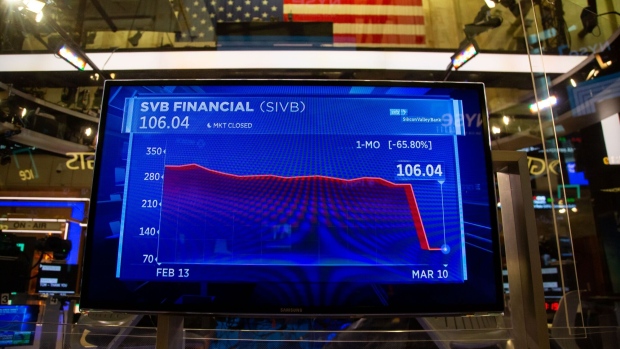Mar 11, 2023
FDIC Races to Start Returning Some Uninsured SVB Deposits Monday
, Bloomberg News

(Bloomberg) -- US regulators overseeing the emergency breakup of SVB Financial Group are racing to sell assets and make a portion of clients’ uninsured deposits available as soon as Monday, according to people with knowledge of the situation.
The initial payout — the amount of which is still being determined — would aim to tide over the firm’s distressed customers, many of them Silicon Valley entrepreneurs and their companies, with more cash to follow as the bank’s assets are sold. The amount will depend in part on the Federal Deposit Insurance Corp.’s progress in turning assets to cash by Sunday night.
Figures being floated behind the scenes for an initial payment range from 30% to 50% or more of uninsured deposits, the people said, asking not to be identified discussing private talks.
A spokesperson for the FDIC didn’t respond to requests for comment on its plans.
Silicon Valley Bank’s business clients are desperate to access their money to keep operations running and employees paid. On Friday, the bank became the biggest US lender to fail in more than a decade, unraveling in less than 48 hours after announcing plans to raise capital. The firm, which swelled in recent years as it soaked up deposits from tech startups, began losing money as those clients burned through their funding and drew down balances.
Read what happened: SVB’s collapse was rooted in Treasury bets in pandemic
At the end of last year, Silicon Valley Bank had more than $175 billion in deposits and $209 billion in total assets — but selling those holdings to meet demands for cash proved costly. That’s because SVB had loaded up on bonds and Treasuries that lost value as the Federal Reserve raised interest rates.
While the FDIC insures deposits of up to $250,000, the vast majority of funds held in at SVB far exceeded that. The agency has said it will make 100% of protected deposits available on Monday.
The amount of uninsured deposits was still being determined, the FDIC said on Friday. The watchdog said it will issue an advance dividend to uninsured depositors soon, with future payments later. Wall Street executives expect there will be a market for selling the rights to recoup deposits.
Easing ‘Pain’
Behind the scenes, senior Wall Street executives have been gaming out the value of the bank’s holdings, and how much cash could be extracted quickly, absent some sort of bailout or deal to sell all or part of the bank to a stronger institution.
In those circles, paying less than half, such as 30%, is seen as too little to avoid severe fallout in the technology sector and potentially beyond.
A partial up-front payment could at least provide some relief, William Isaac, a former FDIC chairman, said in a phone interview Saturday.
“It doesn’t completely eliminate the problem or the pain, but it makes it a lot easier for customers of the bank to deal with their losses,” said Isaac, who held the role from 1981 to 1985.
Deposits aren’t the only way SVB clients have been left in the lurch. The bank also had $62.5 billion of credit commitments at the end of 2022, a figure nearly as large as its loan book.
The firm didn’t provide a detailed breakdown of those commitments, but a majority of its lending was in capital call lines of credit. Those facilities give venture capital and private equity firms the ability to tap cash to immediately invest in a startup, which then gets repaid once the money arrives from pensions and other investors that previously committed to the funds.
If those lines of credit were to disappear, it would likely limit funds’ ability to invest quickly.
As young tech companies pondered over the weekend how they will navigate SVB’s demise, a number of fintechs stepped into the void.
Brex, a platform offering financing to startups, rolled out emergency bridge loans for ventures that need help keeping lights on, according to an offer seen by Bloomberg. In another offer, New York-based credit provider Capchase offered emergency payroll financing.
Read more on the impact: SVB rocks California’s tech founders and vintners
The FDIC has been laying groundwork for a potentially drawn-out sale process, according to senior executives at two investment banking firms that recently spoke with the regulator.
An official told one firm that, despite efforts to reach a resolution quickly, a piecemeal sale spanning weeks or months looked more probable, one of the people said.
The agency informally invited the other firm to pitch proposals for certain assets, a second person said, prompting dealmakers to review prospects for a variety of publicly disclosed holdings, such as a desirable portfolio of loans to California wineries and vineyards.
Read about the holdings: SVB auction block includes VC-focused lender, wealth unit
--With assistance from Michael J. Moore, Katanga Johnson, Amelia Pollard, Gillian Tan, Sonali Basak, Ed Ludlow, Matthew Monks and Jill R. Shah.
(Updates with alternative financing offers for startups from 16th paragraph.)
©2023 Bloomberg L.P.





